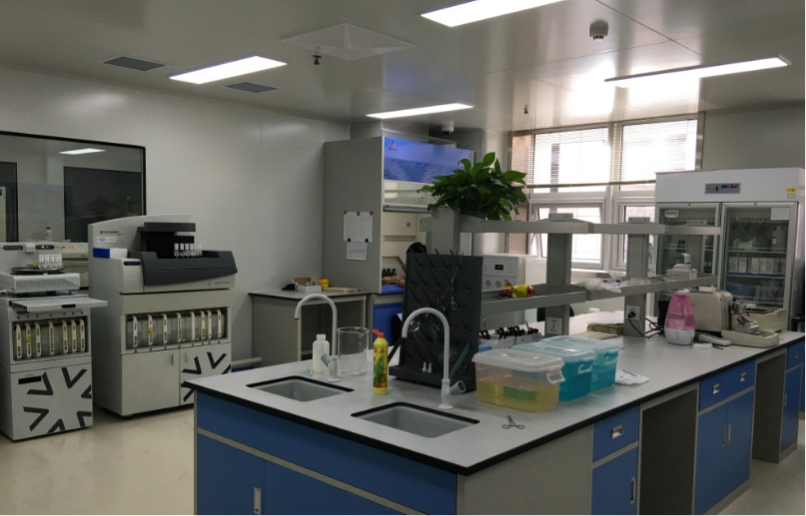I. Profile
The Tumor Molecular Pathology Laboratory (hereinafter referred to as the "Laboratory") is embedded in the Department of Pathology, Affiliated Hospital of Binzhou Medical University, and is located on the fifth floor and the basement floo of the outpatient medical technology complex. The fifth floor mainly includes routine pathological research, morphological observation, cytopathological research, immunohistochemistry, hybridization in situ, immunofluorescence, genetic testing, cell culture, protein electrophoresis, circulating tumor cell detection and molecular biology laboratory, etc. On the basement floor, there are tissue bank, data room, molecular biology laboratory, cell biology laboratory and other work areas, with the current use area as up to 3000 square meters. The Laboratory relies on Shandong Provincial Key Clinical Special Discipline and the Pathology Department of the Affiliated Hospital to Binzhou Medical University as a platform, integrating medical treatment, scientific research, and teaching. The research direction and content of the laboratory are closely integrated with the clinical, which is conducive to completing the transformation of results in a short time. Under the leadership of the director of the laboratory, Professor Wu Shuhua, the research members of this team have won honorary titles such as Oncology Pathology Innovation Team of Affiliated Hospital of Binzhou Medical University and Excellent Research Team of Affiliated Hospital of Binzhou Medical University.
II. The Team
The Laboratory mainly studies tumor occurrence and development, metastasis and drug resistance mechanisms. In the past ten years, under the leadership of Professor Wu Shuhua, the team has been engaged in clinical tumor molecular pathology research. A number of studies have been funded by national, provincial and municipal projects, and have been awarded many provincial and municipal scientific research achievements. At present, three research teams have been established: digestive pathology, female reproductive system pathology, and male genitourinary system pathology. The researchers and research strength are constantly increasing, especially that the work of the digestive tract pathology research team is the most prominent. The research content of the three research directions of the laboratory has its own characteristics, involving tumor epigenetics, non-coding RNA, tumor metabolism and other aspects. The research content supports each other, highlights the research characteristics of pathology, and jointly improves the research level of this discipline.
1. Digestive pathology research team: The research team currently has 9 fixed researchers. Under the leadership of Professor Wu Shuhua, the project has been funded by the National Natural Science Foundation of China and the Natural Science Foundation of Shandong Province. At present, it is mainly engaged in the mechanism of gastrointestinal tumors, molecular Research on target therapy and tumor multidrug resistance mechanism.
2. Female reproductive system pathology research team: The research team has a total of 5 fixed researchers. They have long been committed to the study of breast cancer progression and metastasis mechanisms. With the continuous expansion of researchers, they are currently mainly engaged in breast, ovarian and uterine tumors, and research on progress and transfer mechanism.
3. Male genitourinary system pathology research team: This research team is a newly established research team that the laboratory needs with the development and construction of disciplines in recent years. There are currently 3 fixed researchers, mainly engaged in the progression, metastasis, and progression of kidney cancer and prostate cancer, and research on molecular targeted therapy.
III. Academic Achievements
At present, laboratory researchers have formed three relatively stable research directions in the field of tumor pathology: the research on the mechanism of gastrointestinal tumors, molecular target therapy and drug resistance mechanisms; the role and clinical significance of the development of female reproductive system tumors, and research on the occurrence, development and clinical significance of male genitourinary system tumors, with especially the work of the digestive tract pathology research team being the most prominent.
The digestive pathology research team under the leadership of Professor Wu Shuhua has undertaken 1 National Natural Science Foundation (General Project), 4 Shandong Natural Science Foundation, 1 Science and Technology Development Plan of Shandong Education Department, 2 Shandong Health Science and Technology Development Plan, 2 Binzhou Scientific and Technological Development Plan projects, and 5 Scientific and Technological Development Plans of Binzhou Medical University. In the past 5 years, it has published more than 40 scientific research papers, including 14 SCI papers, and 2 textbooks as associate editor. The research result “Basic and Clinical of Gastrointestinal Tumor” won the first prize of Binzhou Natural Science Achievement Award. “The Imparct and Molecular Mechanism of PI3K/mTOR Signal Pathway Combined with Abnormal Activation of Autophagy on the Occurrence, Development and Drug Resistance of Colorectal Cancer” won the third prize of Shandong Science and Technology Innovation Achievement Award.
The research team on female reproductive system tumors and male genitourinary system tumors has also achieved gratifying results in recent years. In the past 5 years, renal cancer related research results have won one third prize for Scientific and Technological Progress in Binzhou City, one project was approved for the Natural Science Foundation of Shandong Province, three being department-level projects, and 10 SCI papers being published.
IV. Infrastructure

Binzhou Key Laboratory of Tumor Molecular Pathology, relying on the Pathology Department of the Affiliated Hospital to Binzhou Medical University, has a specimen collection room, a tissue processing room, a sectioning room, an immunohistochemistry room, a cytopathology room, an in situ hybridization room, a special staining room, a molecular pathology room, a cell culture room, a protein electrophoresis room, a tissue culture room and other working partitions, with pathological specimen collection table, slicer, automatic tissue processing instrument, cryostat, automatic immunohistochemistry instrument, automatic chromosome and sealing all-in-one machine, remote pathology consultation system, fluorescence quantitative PCR instrument, in-situ hybridization instrument, CO2 cell incubator, chemiluminescence gel imager, biological microscope, fluorescence microscope, low-temperature high-speed centrifuge, -80℃ refrigerator, liquid nitrogen tank, etc. The equipment can meet the requirements of conventional pathology, frozen pathology, in situ hybridization, cell culture, immunofluorescence, protein electrophoresis, real-time fluorescent quantitative PCR and related molecular biology experiments.





